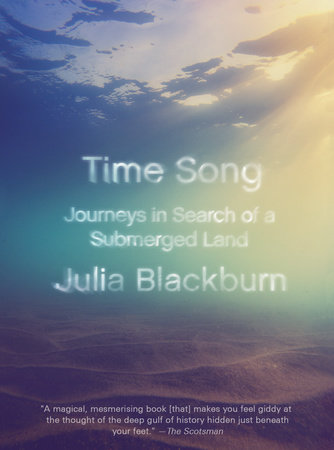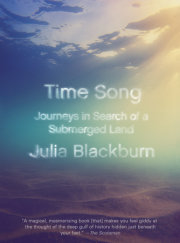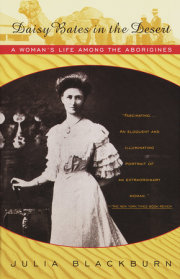‘Oh,’ I say casually, as if in answer to a question, ‘I’m writing about a country called Doggerland. It’s also known as North Sea Land because that’s where it was, under what is now the North Sea. It emerged after the last Ice Age and with the warming of the climate it became a wonderfully fertile place of rivers and lakes, gently rounded hills and sheltered valleys, reed beds and salt marshes in the lowlands, trees on higher ground and a profusion of life: fish, birds, animals and humans as well. These were a people who left few traces of their passing. They hunted with weapons made from wood, bone or stone; they had canoes cut from the trunks of trees; they had dogs working with them and sometimes buried their dead alongside their dogs. But as the ice went on melting the sea levels rose dramatically – you can’t believe how fast, it could be more than two metres within a century – so the land was inundated, familiar places submerged or made inaccessible. Seven thousand years ago, Doggerbank was still there as an island and then it too was gone.
‘And,’ I continue, carried forward by the idea of it all, ‘I am also writing about what happened in this same area long before the last Ice Age. I go back to the first humans who were here, close to where I live: a cache of worked flints was found quite recently near a holiday camp and then a bit further up the coast there is the little flurry of footsteps fossilised in what was once the soft mud of a river estuary. Five people pottering about some nine hundred thousand years ago; they were probably collecting plants and shellfish.
‘Mammoth,’ I say, ‘great herds of them moving across the grassy steppes when Britain was part of the Eurasian land mass. I’ve collected quite a lot of mammoth bones, along with those of other extinct creatures; it’s best to go looking after a storm has scoured the edges of the cliffs to reveal whatever secrets they have been hiding, but I often forget to go then. I did pick up a lovely stone axehead just recently. It looks like nothing much until you hold it in your hand and feel how well it fits, how sharp it is.
‘Of course I ask myself what on earth I think I’m doing, rattling around like a ghost in such distant landscapes of the past, and this is what might be the answer, or at least part of the answer. I am not especially afraid of my own death, but I am afraid of the death of forests and oceans, the contamination of water and air, the sense that we are heading towards a catastrophe from which there will be no escape. I comfort myself with the knowledge that this is nothing new: the climate has often shifted from extremes of heat to extremes of cold; oceans rising to cover the land and shrinking to reveal it in a different form; living creatures emerging in all their strangeness and determination to survive and some of them manage to hold on, but others do not.
‘I wonder now if it makes more sense to imagine infinity going backwards in time, rather than forwards. When you look at it that way round, you no longer have the vague dread of what the future holds, instead there is the intimation of the enormity of everything that has gone before: a solemn procession of life in all its myriad forms moving steadily towards this present moment. You can almost hear the songs they are singing.
‘There is something else. My husband died a few years ago. He has vanished and yet he remains close, beneath the surface as it were, so perhaps I am also trying to catch a glimpse of him within the great jumble of everything else that has been lost from our sight.’
Copyright © 2019 by Julia Blackburn. All rights reserved. No part of this excerpt may be reproduced or reprinted without permission in writing from the publisher.






